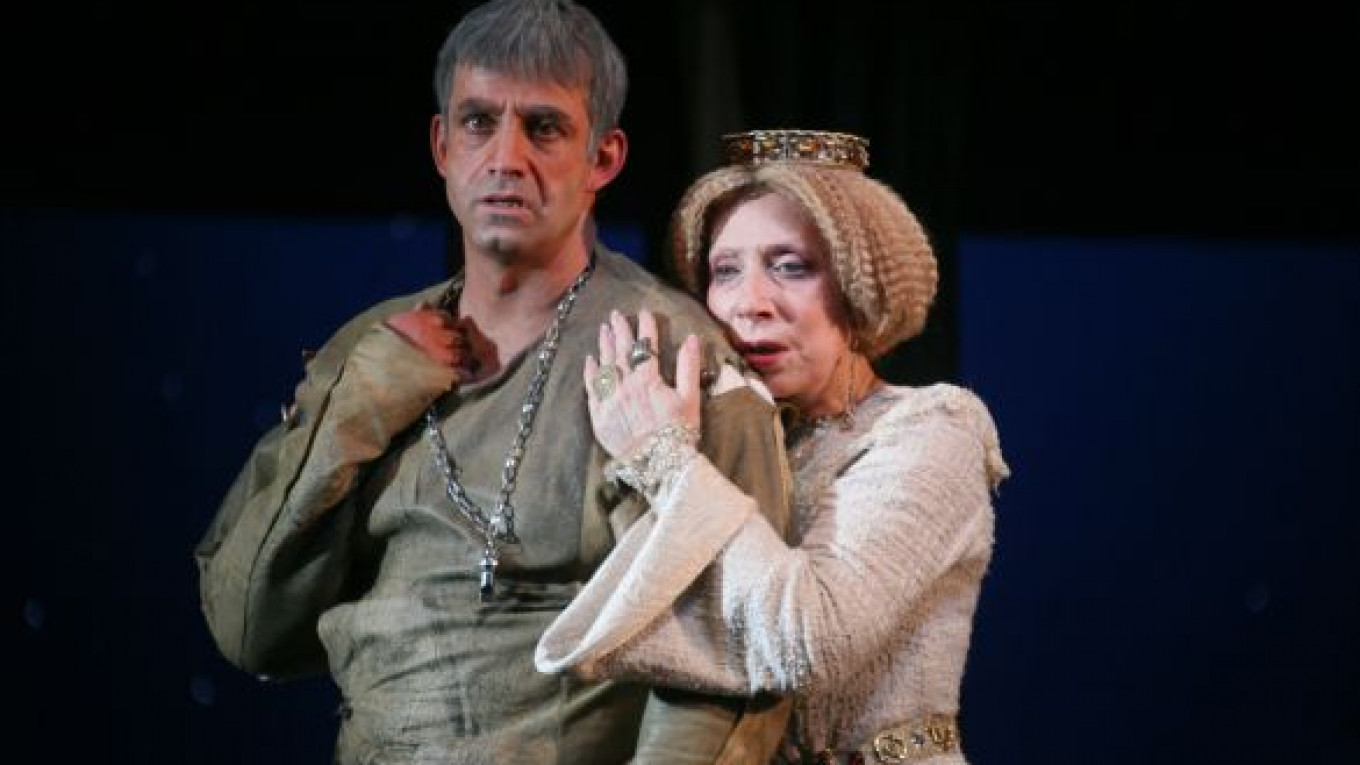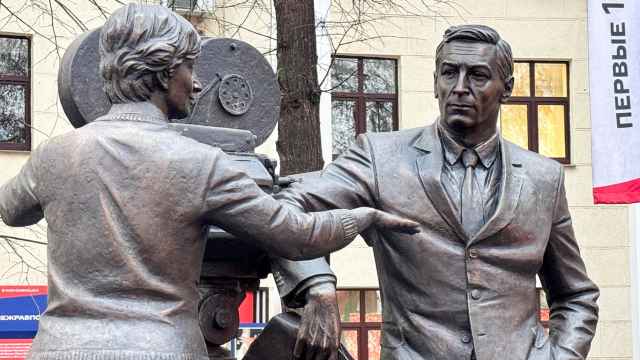I remember seeing “The Lion in Winter,” based on James Goldman’s play, when it hit the movie theaters in the late 1960s. I was in my early teens, and it may have been the first time I had the opportunity to appreciate Katherine Hepburn. Her turn as the disgraced Eleanor of Aquitaine has remained burned in my memory, although I don’t think I’ve seen the film since.
This is especially curious because a theatrical production of the play under the title of “The Lioness of Aquitaine” at the Lenkom Theater jogs almost none of my memories.
One of the reasons for this is Inna Churikova.
Churikova is every bit the film legend in Russia that Hepburn is in the United States. The list of her brilliant film roles, to say nothing of her work in theater, is long and impressive. Few, if any, other Russian actresses active since the 1960s can compare in terms of accomplishment and popularity with audiences.
I, too, have been known to fall under Churikova’s spell, and if it is a weakness, it is one I am proud of.
My point here is that when Churikova walked out on stage for the first time in “The Lioness of Aquitaine” it never occurred to me to compare her to anyone for any reason. She is an artist that takes us far beyond such petty activities.
Churikova’s spunk, her irony, her playfulness and her intelligence are visible in her facial expressions and readable in her gestures and gait. Her Eleanor relishes the opportunity to enjoy her annual few days free from prison at Christmas — Henry II (Dmitry Pevtsov) has kept her locked up for a decade while taking up with his latest in a long line of girlfriends.
Most important, however, is the joy Eleanor experiences upon having the rare chance to exert influence on her sons — the under-confident Richard the Lionheart (Sergei Piotrovsky), the stoic but opportunistic Prince Geoffrey (Dmitry Gizbrecht) and the ambitious, unthinking Prince John (Igor Konyakin). Eleanor’s children provide her with a great field of battle, a place to exercise her wit and wield her power. Their struggle for the future crown is her leverage for position with her conniving husband.
Centering many of the conflicts that arise is Henry’s lover, the cute, impetuous and, ultimately, empty Princess Alais (Alla Yuganova).
She imagines herself to be in the position to determine future events, but, in fact, is ignored entirely by everyone, including her brother, King Philip of France (Anton Sorokin).
Through it all, the jesting, the bantering and the open warfare, Churikova’s remains a fully nuanced presence. She is complex and smart, hard as diamonds yet always able to call forth understanding and feeling for those she sides with and against.
There is another side to the story of this production, however, and it is not as imposing.
Gleb Panfilov, who has often been the director behind Churikova’s greatest film triumphs, seemed not to have much interest in filling out any of the characters besides Eleanor.
All of them, without exception, are one-sided. Once they have been presented to us, we know exactly how they will react in any situation and what tools of persuasion they will employ (a blustery howl, a sarcastic eye, a weepy whine).
Even the set by Andris Freiberg seems perfunctory. The stage is usually kept open, occasionally with a bed rolled into place for intimate scenes. Some decoration around the perimeters combines with the costumes by Kristina Pasternak to remind us that the action is taking place in the 12th century.
Throughout it all the sensation grows that there is one, and only one, reason to be watching this performance — Inna Churikova. Time and again the actress raises the show’s quality, provides it with shading, detail and substance, only to see everything drop like a bad soufflé again when the others take over.
Panfilov seemed intent on making this the story of a family and a marriage and, to some degree, he succeeded.
The theme that emerges from “The Lioness of Aquitaine” is something to the effect of “the family that fights together stays together.” Eleanor and Henry thrive on conflict, deception and devious strategies mounted against each other. The game of mental and verbal fisticuffs itself becomes the glue that keeps them together, and will not allow them to cut their children loose.
But, Churikova’s convincing performance aside, that rarely adds up to convincing theater in this production.
“The Lioness of Aquitaine” (Akvitanskaya Lvitsa) plays Sunday, Monday, July 23, 24 and 25 at 7 p.m. at the Lenkom Theater, located at 6 Ulitsa Malaya Dmitrovka. Metro Pushkinskaya. Tel. 699-9668, . Running time: 3 hours, 10 minutes.
A Message from The Moscow Times:
Dear readers,
We are facing unprecedented challenges. Russia's Prosecutor General's Office has designated The Moscow Times as an "undesirable" organization, criminalizing our work and putting our staff at risk of prosecution. This follows our earlier unjust labeling as a "foreign agent."
These actions are direct attempts to silence independent journalism in Russia. The authorities claim our work "discredits the decisions of the Russian leadership." We see things differently: we strive to provide accurate, unbiased reporting on Russia.
We, the journalists of The Moscow Times, refuse to be silenced. But to continue our work, we need your help.
Your support, no matter how small, makes a world of difference. If you can, please support us monthly starting from just $2. It's quick to set up, and every contribution makes a significant impact.
By supporting The Moscow Times, you're defending open, independent journalism in the face of repression. Thank you for standing with us.
Remind me later.







